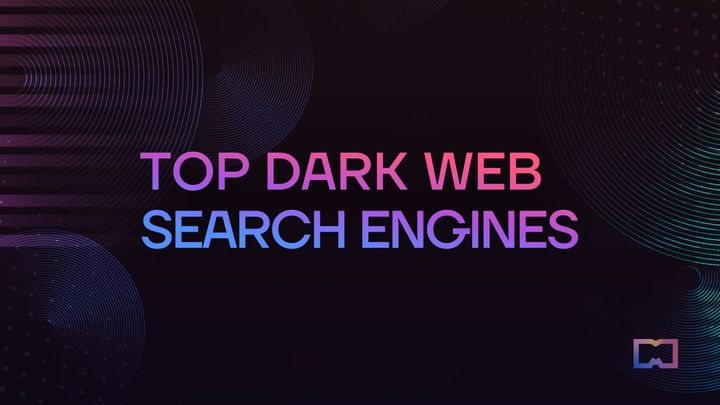10 Top Dark Web Search Engines for 2023


In Brief
Unearthing hidden secrets on the dark web safely demands specialized tools.
The internet has become a crucial component of our lives in the current digital era by providing access to a large world of chances and information. The “deep web” or “darknet,” on the other hand, is a secret space that conventional search engines like Google or Bing are unable to index.
| Pro Tips |
|---|
| 1. Unlock the Hidden Depths of the Internet with the Best 10 Dark Web Browsers for Anonymous Deep Web Surfing. |
| 2. Secure Your Digital World with the 15 Best Free Password Manager Apps in 2023. |

In this strange realm, anonymity rules supreme, allowing users to view content not available on the mainstream web, browse hidden websites, and interact safely. Darknet search engines are specialized tools that can be used to efficiently browse this covert environment. The darknet is navigated and organised by these advanced search engines, which makes it simpler to find unlisted websites and resources.
The Enigma of the Darknet
The darknet is a hidden area of the internet that traditional search engines like Google or Bing cannot access. It is unavailable using standard web browsers and needs to be accessed through specialized software, such as Tor (The Onion Router). The darknet is a shelter for activists, cybercriminals, people who cherish their privacy, and other people who want to remain undetected.
Exploration of Darknet Search Engines
Darknet search engines concentrate their attention on the content of the dark web, much like ordinary search engines do. Similar to how Google crawls the clearnet, these algorithms scour through dark websites, meticulously reviewing their pages. Thanks to these characteristics, users have the choice to view material while remaining anonymous.
The majority of darknet search engines make use of onion services, a server network that purposefully hides users’ IP addresses. This layer of confidentiality is essential when exploring stuff on the dark web. Additional privacy features, such as encrypted connections, may also be included in these search engines.
1. TORCH
TORCH, an expansive and well-established darknet search engine, boasts the indexation of over one million .onion sites from the dark web’s labyrinthine expanse. It offers intuitive search features, featuring indispensable operators like site:, title:, and ext: for site, title, and file extension-based searches. Advanced searchers may use date range tools to filter results by date.
It furnishes filters for categorization, language, and document type. TORCH’s simplistic, Google-like interface renders it an accessible starting point for most dark web explorations, albeit with limited search functionality compared to its Clearnet counterparts.
Pros:
- Vast repository of dark web content
- User-friendly interface
- Comprehensive search operators and filters
Cons:
- Relatively constrained functionality in comparison to clearnet search engines
- Optimal performance necessitates JavaScript activation
2. Candle
Candle positions itself as the preeminent dark web search engine for expeditious retrieval of diverse content. It boasts exhaustive coverage of darknet markets, forums, chat rooms, and ancillary services. The uncluttered interface features shortcuts for perusing various dark web categories, encompassing social, financial, commercial, and political content.
It provides invaluable format filters, accommodating searches for images, videos, books, and more. Candle distinguishes itself through unique functionalities, including the “Paste” tool for analyzing leaked databases and extracting credentials, alongside “Relate,” which establishes connections between disparate dark web entities.
Pros:
- Robust search capabilities
- Valuable category and format filters
- Unique tools like “Paste” and “Relate”
Cons:
- Requires disabling of NoScript extension
- Operates at a comparatively slower pace
3. Ahmia
Ahmia, a well-regarded meta-search engine, dispatches queries to a multitude of dark web indices. It purports to canvass over ten thousand .onion sites from thirty-lemented by category and format filters. Autocomplete suggestions expedite the process of locating common searches.
An optional search plugin augments browser address bar searches with encrypted queries. Ahmia distinguishes itself through its emphasis on security, as queries traverse various nodes to obscure user locations. The open-source nature of its code underscores a commitment to transparency.
Pros:
- Queries encompass over thirty darknet indexes
- Strong focus on security and anonymity
- Open-source code, exemplifying transparency
Cons:
- Dependency on JavaScript compromises full privacy
- Search capabilities fall somewhat short of competitors
4. Dark Search
Dark Search positions itself as the ultimate bastion of anonymity among darknet search engines. Encrypted searches routed through three server nodes shroud users’ identities in secrecy. The minimalist interface prioritizes uncomplicated keyword searches sans filters or operators.
Despite its simplicity, results are swiftly generated, though somewhat constrained in scope compared to more expansive engines. An autocomplete function lends celerity to search term predictions.
Dark Search, characterized by its lightweight nature, forgoes certain convenience features. For instance, users must manually copy and paste links instead of directly clicking them. In summation, it delivers rudimentary but efficient searches fortified by an unwavering commitment to anonymity.
Pros:
- Exemplary levels of privacy and anonymity
- Expedient and straightforward search functionality
- Lightweight, minimalist interface
Cons:
- Absence of advanced search operators
- Links in results necessitate manual copying and pasting
5. Onionland Search

OnionLand conducts searches across both the clearnet and dark web by leveraging multiple indices. Users may filter searches to encompass the darknet exclusively or span both realms. The clean design facilitates seamless navigation, complemented by keyboard shortcuts, auto-suggestions, and an assortment of useful search tools, including site and related operators.
Multiple language interfaces enhance accessibility. OnionLand incorporates privacy-enhancing features such as encrypted connections and anonymizing proxies, striking a balance between usability and privacy, albeit not achieving complete anonymity.
Pros:
- Searches span both the clearnet and dark web
- Extensive selection of search operators
- Multilingual interface
Cons:
- Privacy level lags behind certain competitors
- JavaScript activation is requisite
6. DeepWeb

DeepWeb distinguishes itself with a visually polished facade, catering to both novices and seasoned dark web explorers. Search operators such as Site and intext afford precision in result filtering. The built-in translator accommodates page translation into over a hundred languages. Auto-complete tooltips expedite common search queries.
DeepWeb functions as a capable dark web search solution, though sporadic sluggishness in performance when contrasted with more streamlined rivals may be noted. Privacy, though not its foremost priority, is addressed.
Pros:
- Modern and aesthetically appealing interface
- In-built translation utility
- Valuable advanced search operators
Cons:
- Occasional performance lags
- Privacy takes a back seat
7. SearX
SearX emerges as a decentralized metasearch engine configurable for delving into the dark web. Drawing results from over seventy distinct search services and indices, it offers unparalleled versatility. The open-source platform can be deployed on personal servers for absolute anonymity.
SearX’s public version at searx.me preserves a modicum of privacy by routing queries through proxies. Performance remains contingent on the specific underlying search engines enabled. The basic interface, while bereft of embellishments, delivers competent results.
Pros:
- Decentralized and amenable to self-hosting
- Comprehensively searches across seventy-plus services
- Open-source framework
Cons:
- Privacy contingent on configuration
- Interface retains a rudimentary demeanor
8. DuckDuckGo
Although not expressly tailored for the dark web, DuckDuckGo may be configured to unearth select darknet content. This privacy-centric engine maintains an onion service, expanding its accessibility to the dark web. Queries conducted through this address will encompass results from Tor’s hidden services.
A “!onion bang” search yields analogous outcomes, providing a convenient avenue for delving into dark web content. While DuckDuckGo’s search scope does not rival that of dedicated darknet engines, it offers familiarity, requiring no supplementary tools.
Pros:
- Scours a subset of dark web content
- Established platform with a commitment to privacy
- Onions service augments search functionality
Cons:
- Limited dark web coverage
- Requires .onion address for comprehensive dark web searches
9. Tor Search
TorSearch serves as both a rudimentary dark web search engine and a directory of auxiliary services. The homepage affords direct links to diverse darknet sites and resources. While search functionality is relatively straightforward, lacking advanced options, its performance is nimble.
The search bar proffers autocomplete functionality for the prediction of search terms. TorSearch caters to casual dark web denizens in search of an uncomplicated engine. The curated directory, a valuable asset, serves as a springboard for deeper exploration.
Pros:
- Uncomplicated and clean interface
- Swift results emphasize quality
- Curated compendium of dark web resources
Cons:
- Limited search capabilities
- The index of content remains relatively modest
10. Recon
Recon, while comparable to other dark web search tools, does have some distinctive advantages and disadvantages that are targeted at a particular user base. It sets itself apart with a sleek exterior, making it a desirable option for both inexperienced and seasoned dark web users.
Pros:
- Recon has strong search operators like “Site” and “intext,” enabling users to hone their search terms for more precise results.
- Visually Appealing User Interface: Recon stands out thanks to its cutting-edge, beautifully polished user interface, which makes it appealing and easy to use for both inexperienced and seasoned dark web users.
- Language Accessibility: Web pages can be translated into more than a hundred languages using Recon’s built-in translator, making them available to a wide audience.
Cons:
- Occasional Performance Lags: When compared to more streamlined dark web search engines, Recon’s performance may occasionally lag for some users. This can make it take longer to get search results.
- Despite the fact that Recon has useful search functions, privacy is not its first priority. Other dark web search engines might be better suited for users who want a higher level of anonymity and privacy.
Key Attributes to Scrutinize in a Darknet Search Engine
In the evaluation of darknet search engines, several pivotal attributes warrant consideration:
- Index Size: The number of indexed sites, where a greater tally usually translates to superior search coverage.
- Anonymity Features: Mechanisms such as onion routing, proxies, and encrypted connections that safeguard user privacy.
- Search Operators: Advanced filters, exemplified by site: and filetype:, for pinpoint search precision.
- Ease of Use: A user-friendly interface that engenders a seamless experience.
- Speed: The promptness with which search results are delivered.
- Categories/Filters: Mechanisms for fine-tuning searches by language, format, content type, etc.
- Security: Open source code and transparent disclosure policies upholding principles of transparency.
The most effective dark web search engines strike an equilibrium between comprehensive content indexing, robust feature sets, and privacy preservation. However, it is imperative to acknowledge that heightened anonymity often entails concessions in functionality.
FAQs About Darknet Search Engines
Yes, darknet search engines per se are lawful. They merely index publicly accessible dark web content. Nevertheless, they may facilitate access to unlawful or perilous material, with users responsible for their compliance with legal mandates.
While most darknet search engines function without Tor, its use is strongly recommended for anonymity. The .onion sites indexed by these search engines can solely be accessed through Tor.
Yes, certain portions of the dark web elude the indexing grasp of search engines. Some sites preclude indexing or exist within private darknets. Users may discover these resources via directories, forums, or word-of-mouth referrals.
With due precautions, detection becomes exceedingly challenging. The employment of Tor affords a reasonable degree of anonymity. To enhance privacy, avoid logging in or divulging identifying information. Additional tools like VPNs or proxy chains can further fortify user privacy.
The intricacies of routing, requisite for accessing and indexing dark web content, can impact performance. Speed is often sacrificed to bolster anonymity. Furthermore, connectivity on the Tor network may exhibit decreased celerity in general.
Darknet Search Engines Comparative Overview
| Search Engine | Index Size | Anonymity | Search Tools | Ease of Use | Speed | Other Features |
|---|---|---|---|---|---|---|
| TORCH | Extensive | Noteworthy | Comprehensive | Intuitive | Moderate | Categories, Languages |
| Candle | Substantial | Moderate | Diverse Tools | User-Friendly | Sluggish | Categories, Formats |
| Ahmia | Pervasive | Superb | Limited Operators | User-Friendly | Moderate | Meta Search, Plugins |
| Dark Search | Moderate | Superlative | Absent Operators | Intuitive | Expeditious | Minimalist |
| OnionLand | Substantial | Notable | Abundant Operators | User-Friendly | Swift | Languages, Clearnet Integration |
| DeepWeb | Substantial | Moderate | Prolific Operators | User-Friendly | Leisurely | Translation, Aesthetics |
| SearX | Pervasive | Configurable | Select Operators | Moderate | Variable | Open Source, Self-Hostable |
| DuckDuckGo | Limited | Superb | Select Operators | Intuitive | Swift | Established Platform |
| TorSearch | Limited | Notable | Sparse Operators | Intuitive | Expeditious | Curated Directories |
| Torch | TorSearch | Expansive | Noteworthy | Abundant Operators | User-Friendly | Moderate |
Conclusion
Darknet search engines are essential resources for anyone wishing to explore the mysterious depths of the internet. They give the benefits of privacy and access to a plethora of knowledge that is yet inaccessible to traditional search engines. However, users must take caution because the darknet contains both illegal content and security risks.
Disclaimer
In line with the Trust Project guidelines, please note that the information provided on this page is not intended to be and should not be interpreted as legal, tax, investment, financial, or any other form of advice. It is important to only invest what you can afford to lose and to seek independent financial advice if you have any doubts. For further information, we suggest referring to the terms and conditions as well as the help and support pages provided by the issuer or advertiser. MetaversePost is committed to accurate, unbiased reporting, but market conditions are subject to change without notice.
About The Author
Damir is the team leader, product manager, and editor at Metaverse Post, covering topics such as AI/ML, AGI, LLMs, Metaverse, and Web3-related fields. His articles attract a massive audience of over a million users every month. He appears to be an expert with 10 years of experience in SEO and digital marketing. Damir has been mentioned in Mashable, Wired, Cointelegraph, The New Yorker, Inside.com, Entrepreneur, BeInCrypto, and other publications. He travels between the UAE, Turkey, Russia, and the CIS as a digital nomad. Damir earned a bachelor's degree in physics, which he believes has given him the critical thinking skills needed to be successful in the ever-changing landscape of the internet.
More articles

Damir is the team leader, product manager, and editor at Metaverse Post, covering topics such as AI/ML, AGI, LLMs, Metaverse, and Web3-related fields. His articles attract a massive audience of over a million users every month. He appears to be an expert with 10 years of experience in SEO and digital marketing. Damir has been mentioned in Mashable, Wired, Cointelegraph, The New Yorker, Inside.com, Entrepreneur, BeInCrypto, and other publications. He travels between the UAE, Turkey, Russia, and the CIS as a digital nomad. Damir earned a bachelor's degree in physics, which he believes has given him the critical thinking skills needed to be successful in the ever-changing landscape of the internet.


















































